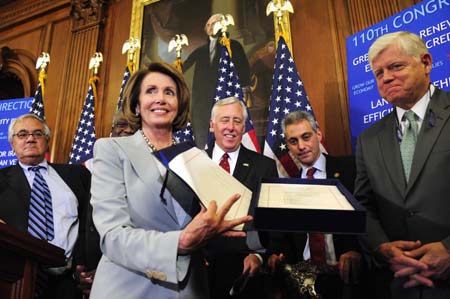The U.S. House of Representatives on Friday approved a 700 billion dollar Wall Street rescue plan with a 263-171 vote, authorizing the Bush administration to make the largest financial intervention after the Great Depression.
|

|
|
U.S. House of Representatives Speaker Nancy Pelosi (front L) presents the financial rescue package bill she just signed in Washington, Oct. 3, 2008. [Xinhua]
|
Under the plan, the federal government has the power to buy bad mortgage-related securities and other devalued assets from embattled financial institutions to help them resume lending to businesses and consumers, preventing a widening credit crisis from driving the economy into a recession.
Just four days ago, the House had rejected the plan by a vote of 228-205. However, what happened in the past few days changed the position of House lawmakers who had voted no to the bill.
Deterioration of economic situation
After the massive rescue plan failed in the House Monday, Wall Street's fears that the country was heading toward a spiraling credit and economic crisis intensified.
As a result, the Dow Jones average plunged by almost 780 points, or nearly 7 percent, marking the biggest single-day drop ever.
Broader stock indicators also tumbled. The Standard & Poor's 500 index and the Nasdaq composite index dropped by a even bigger 8.81 percent and 9.14 percent respectively.
The turmoil was followed by the news that Wachovia Corp., one of the biggest banks hit by rising mortgage losses, had sold out to Citigroup Inc.
The takeover of Wachovia by Citi followed the recent forced sale of Merrill Lynch & Co. and the failure of three other huge banking companies -- Bear Stearn Co., Washington Mutual Inc. and Lehman Brothers Holdings Inc., all of which fell due to bad mortgage investments.
The big worry was that more institutions would follow. The Federal Deposit Insurance Corp. has a list of more than 110 banks that were in trouble in the second quarter, and the number has surely grown in the third.
More gloomy news for the world's largest economy came before the House voted on the bill once again Friday.
Employers slashed some 159,000 jobs in September, the most since March 2003, while the nation's unemployment rate remained at a five-year high of 6.1 percent.
Home prices were plummeting and U.S. manufacturing activity fell to the lowest level since Oct. 2001.
With all these reminders of how troubled the nation's financial system and economy are, lawmakers irrespective of party affiliations would have to reconsider their rejection of the bill
Bill modified
The bill, thrown out of the House Monday, was passed in the Senate by a handsome 74-25 margin Wednesday.
Before the Senate's vote, however, the bill was modified to make it more attractive to House Republicans.
The modified bill raised the ceiling on federal insurance for bank deposits from 100,000 dollars to 250,000 dollars, as suggested by U.S. presidential candidates Democrat Barack Obama and Republican John McCain.
It added up to 150 billion dollars in tax break extensions for middle class families and businesses and retained the limits of "golden parachute" severance payments to disgraced Wall Street executives.
Another big change came from the Securities and Exchange Commission(SEC), which decided to ease rules that force companies to devalue assets on their balance sheets to reflect the price they can get on the market.
The modifications helped House Republicans claim credit for some substantive changes.
With constituent feedback changing dramatically and the market plunging following Monday's disapproval, lawmakers' comfort level with the bill rose markedly and their opposition eased.
Bush lobbies hard
President Bush has urged lawmakers to pass the rescue plan almost every day since the bill was submitted to Congress on Sept. 20.
It was unusual for the president himself to lobby aggressively for a bill's passage. The fact showed that the country is facing a severe financial crisis.
Noting that the bill is "urgently needed to address a crisis in our financial system that threatens the entire U.S. economy," Bush warned that the crisis in the financial markets "has gone way beyond New York and Wall Street."
"This is an issue that's affecting hardworking people," Bush told reporters after meeting with more than a dozen manufacturers and business owners from across the country Thursday.
"The House of Representatives must listen to these voices and get this bill passed so we can get about the business of restoring confidence," he emphasized.
The president even made one-on-one calls to lawmakers to persuade them to vote yes to the bill.
Since the credit crisis broke in August last year, a package of measures had been taken by the Bush administration to stabilize the market and shore up the economy.
But those efforts have produced little effect in boosting market confidence.
The Bush administration hopes that the rescue plan, designed to address the root problem of the financial crisis -- bad debt on the balance sheet of financial institutions -- will help achieve the goal.
While advocates hail the bailout plan as the best hope to save the financial system and revive the economy, some economists have warned people not to expect immediate results.
(Xinhua News Agency October 4, 2008)